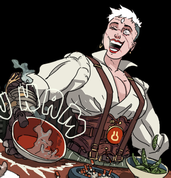|
Pussy Quipped posted:If you wanna be a stickler for the rules, the familiar isn't actually a beast it is a fey, fiend, or celestial and therefore cant communicate with a PC via Speak with Animals. I think that's what I'm going to go with. I think I might have some plans for Iarno though to link the players to another campaign. edit: Actually what about having the Black Spider polymorph Iarno to look like himself and have the Black Spider be an overarching BBEG.
|
|
|
|

|
| # ? Jun 11, 2024 21:45 |
|
That works! My PCs apprehended Albrek and took him to jail, so I wound up bringing that around on a later date. Albrek broke out of jail, and the PCs were hired to recapture him. The Black Spider also evaded capture/death, so I got to reuse him as a recurring antagonist for a bit, until my party drowned him in a water barrel. I'm kinda fond of the PCs being familiar with their antagonists.
|
|
|
|
I just started a homebrew campaign with a couple peeps I selected from two different groups I was running Phandelver with, because they were more invested and interested in playing. I'm still quite inexperienced, though, with maybe 6 sessions total under my belt. I decided to run a game of Microscope with them to define the setting, which was actually really cool! The only stipulation I had is that I wanted the campaign itself to have an Exploration/Piratey vibe. We ended up with the following: * Sprawling empire of Dakur rules continent through use of magic * Magic starts dying out, empire crumbles * Factions rise up and fight amongst themselves/coexist for a while - league of merchant city-states, apocalypse conspiracy-cult, orc khanate that runs on animal labor, dwarf+gnome mountainhome, and a democratic elf refugee society that got burned down by apocalypse cult and rebuilt later * A dude shows up alone in a ship 150 years after leaving for the ocean but time hasn't passed for him and he doesn't remember poo poo * People figure out that special crystals from the old empire allow crossing the sea, which had never been possible before * A new land is discovered, a sprawling archipelago of tropical isles To justify the player characters meeting and going there, I came up with the idea that the New World League (a mercantile guild that sort of runs poo poo in the Isles) started a program to recruit adventurers, or anyone who will come, really, to help make the place livable, because it's hella dangerous. That's where the players come in. On session 0.5, they crossed the ocean by ship, and went past what I call "The Curtain", at which point their latent magical abilities which were only faintly present in the old lands really started to come in. Session 1 was them getting acquainted with the port town and the program they're in, going on a quest to find a missing scout, killing a giant spider, and meeting a couple NPCs. They've started figuring out that the island is pretty magical. As for the big picture stuff, I could use ideas. What I've thought of so far is that one of the first emperors of the old empire of Dakur made a deal with a powerful devil to acquire power and take hold of the continent, and then made a magical bubble to isolate the land from the outside planes so as not to have to pay his due. However, this also cut the continent off from outside magic, which meant that it eventually ran out, causing the empire to fall. The crystals from Dakur are the key to crossing the bubble, but they also poke holes through it and allow magic to slowly seep through, and maybe reveal it to the outer planes. Here's where I could use input: * The story takes place 30 years after the Isles have been discovered. Natives haven't come into the picture yet, but it'd be interesting to have social conflict and enemies that aren't just wild animals or dumb monsters - it would also be interesting to see how they interact with magic since it never died out outside the bubble. How do I introduce them? * They found a crystal of concentrated magical energy that they turned in to an artificer as basically a token to get a random magical item. The way I set it up is that different colors represent different densities of magic and also the rarity of item that comes out. What's a fun way to also make this system story-relevant? * It'd be cool if there were remnants of the old empire around to show that they knew about lands outside the continent in secret. How can I make these interesting and mysterious? * I want to eventually transition from the players being employees of the League to working on their own from a homebase (preferably a ship), maybe taking some of their favorite NPCs with them, but I can't seem to think of a way they would do that yet. Maybe it'll come in time. * My players want mystery, intrigue and social conflict. Those are the kinds of plots I'm having the most trouble coming up with. They're a Forge Cleric, Archfey Warlock, runaway Sorcerer and child Wizard, if that helps. I know this post isn't really objective or focused but I've seen tons of great ideas and advice thrown about here and I figure it can't hurt to get some input. Homebrew plots are a super new thing to me and I'm really excited but also feel in over my head - just writing this out helped a lot, really!
|
|
|
|
Intrigue plots are easier than people think they are - they just require the GM to be a little less objective-focused. The way I like to approach them is to sit down and put together a list of the important and semi-important people in the place where the Intrigue is going to happen. So for example, let's say we're talking about a small independent Duchy. There's a neighboring Kingdom that would love to control the Duchy, but for whatever reason they don't want to just go in a'conquerin' (maybe they have other powerful neighbors that would attack them if they tried). So they're trying to Intrigue the place into their orbit. The Duchy, on the other hand, can't just say "hey gently caress off" because the Kingdom really could crush them if they set their minds to it. So in the Duchy we'll have to look at our Important People. We'll have the Duke, obviously. Then his kids; let's say he has three of them, two boys and a girl. He'll have advisors; let's go with a Marshal, a Court Wizard, a Vizier, and a Seneschal (a Master of Coin type). Various important court noble families and their hangers-on, guild leaders, et cetera. Make out a list of all those people. Then we start figuring out where people stand. The Duke, naturally, desires to preserve his independence, as does his older son and heir. His younger son, however, feels like he's doomed to unimportance as things stand now, so he's been meeting with agents of the Kingdom; if they'll give him a path to the throne, he'll throw in with them. The Marshal, being a gruff military honorable type, prizes the Duchy's independence, while the Seneschal is concerned that the Duchy is running out of money (because the Kingdom has been pressuring their usual trade partners) and is willing to sign on with the Kingdom in order to stay solvent and keep everyone fed. One or two noble families should feel strongly on either side of the issue; so should a couple of guild leaders (the Masons' Guild is very pro-independence, let's say, because they're very important to maintain the Duchy's defenses - but if the Kingdom takes over, they'll just be one more group of laborers in a very large pool; meanwhile the Alchemist's Guild is pro-Kingdom, because Alchemists tend to be more respected there and it'll give them better access to rare reagents). A few Temples, too. Everyone else should be mostly neutral - maybe they lean one way or another, but they can be swayed. Once we have the basic political situation, then, we have to start thinking about who's doing what. So the Kingdom is probably pinning most of its hope on the Duke's younger son, but they're probably not ready to start just assassinating people. They probably are ready to start making him look good, though. So they set up some bandit raids; the plan is, he'll lead some men and 'defeat' the bandits, so the people will call him a hero. They'll also want to make the elder son look bad, so they start sending agents to try and seduce him; the idea being that if they can make him look like he's a whoremonger the local Temples will start complaining about him. One of the local pro-Kingdom families is openly making their sympathies known, so all interested parties are taking notes of who shows up to cheer them and who shows up to boo. Meanwhile the pro-independence groups aren't sitting on their hands; they're sending out bands of street toughs to vandalize known pro-Kingdom families and businesses. The idea is to sit down and figure out who's doing what and why, and who might be swayed one way or the other, without the PCs getting involved. Then the PCs get involved. How they get involved is up to you; the easiest way is to have them fight the bandits before the Duke's younger son can, but there are other options. Have them uncover the basic plot they've encountered - if not the Big Picture. Once you've done that, you know A) who's mad at them (the younger son, angry that his moment of glory was snatched away) and B) who likes them more (the older son? the Marshal?). Now they have allies and enemies. You don't even need to point them towards choosing one side or the other (maybe they want the Kingdom to absorb the Duchy, only now they've upset their patrons' plans, so they get a new mission to make up for their failure). The whole point is, you set up this big web of interconnected relationships, and then the PCs come in and snap a few strands of that web. Once that's done, you sit down and say "okay, so did what happen change anyone's mind? Did it move any neutrals one way or the other? The guys whose plans got broken up, what will they do in response?" But at no point do you say "okay, here's the next thing the PCs have to do." It's only once you feel like the various plots have reached critical mass - that enough of the neutrals have been swayed one way or the other that intrigue is no longer going to get the job done by itself and it's time to send in the guys with knives - that you start laying an overarching narrative over the story. Let the PCs run into things in their own way, in their own order. (but what if the PCs never notice one of the ongoing Plans? Well, then the Plan works. The noble family successfully schemes to have the Duke's daughter wed to a pro-Kingdom scion, or the Alchemist Guild's lab gets blown up with a message left behind saying 'this is what happens to traitors' or whatever. Let that move some of the neutrals.) Intrigue plots can't - IMHO - be handled like a standard adventure, where the idea is 'get the PCs to go somewhere and do a thing.' Intrigue plots work best when they're constructed like a Jenga tower, and you let the PCs decide which bricks to pull out when - and how quickly.
|
|
|
|
^^^ This. The especially important bit is to have things that the PCs aren't addressing move along at their own pace. PCs ignore all of the signs that there's an assassination plot on? Oh, poo poo, the Duke just got killed! Stuff like this gives the players the sense that they're caught up in larger events.
|
|
|
|
Ilor posted:^^^ This. And if they miss what you planned on being a big hook, go with the repercussions even if they are disastrous. My party right now is completely ignoring that someone is trying to transport a tarrasque egg to a lab and are instead going for loot and gold instead of trying to control or destroy the egg or any other approach. GUESS WHAT THEY MIGHT FIGHT LATER.
|
|
|
|
Ilor posted:^^^ This. Absolutely do this. It can also be fun - especially if you start feeling like the PCs might be having too easy a time - to make them aware of two simultaneous plot threads, and make them decide which (if either!) they decide to interfere with. So, for example, if the Duke's younger son is planning on arresting the pro-independence Guild leader on trumped up charges and a pro-union noble family is deliberately squeezing a local temple's tithes until they announce support for union, whichever plot the PCs don't stop succeeds. Now the PCs have to decide who might be more important to them, the guild or the temple. Having said that, it occurs to me, one thing you do not want to do is rush them early on. You want the PCs to have enough time to figure out what's going on, decide which side they're on, and start acting proactively as opposed to just reacting. Think of an Intrigue Game as having three phases: In Phase One the PCs are largely unaware of all the Machiavellian plotting happening around them. This is where you're relying on all that prepwork you did to decide who's doing what and how the appearance of the PCs and their actions might upset the delicate balance. Try not to punish the PCs much for "missing" - or just not being interested in - plots at this point. This is all setup and buy-in. (a party may also decide to ignore all the plots they come across, BTW, and if that happens it's best to set aside your Intrigue Plot and just let them kill poo poo; even if they said they wanted Intrigue, they clearly aren't buying into it, so don't be afraid to shift gears) Phase Two starts once the PCs have a pretty clear idea of who's involved on all sides of the intrigue. They might not know all the players, but they know a bunch - and they've decided basically which side of the conflict they're coming down on. They've made friends and they've made enemies, and the picture around them is starting to come clearer. This is when the plots should start speeding up and consequences for missing or ignoring a plot should start getting serious - in reaction to the PCs, not just to poke at them. Try and make it clear to the players that they are the reason why things are accelerating - that they're the unknown factor that has pushed people into rasher and more precipitous action than they might have otherwise been willing to commit to. Phase Three is the endgame; it's when sides have been chosen and lines have been drawn, when most of the neutral parties have made their decisions, and when - barring the occasional last-second Sudden Betrayal - everyone knows what side everyone is on. The side that's losing - hopefully the side the PCs aren't on - knows full well that they're not going to scheme their way out of this mess anymore, not without getting blood on their hands, and this is when the assassinations start getting planned. This is the phase where you're transitioning from intrigue into action, where you can get down to the Killing poo poo stories. It's your payoff, it's when the villains who have been orchestrating matters for the whole game are finally facing the tip of your blade. Make the "it's time to finally kill the enemy nobles" scenes satisfying; they've earned it. EDIT: essentially, the speed of the NPC plots (and the likelihood of more severe consequences for ignoring them) should increase at the same rate as player participation. The deeper they get into the web of intrigue, the more that the NPCs should step up their game - in response to the PCs, who are an unexpected factor. DivineCoffeeBinge fucked around with this message at 22:37 on Mar 29, 2018 |
|
|
|
Nthing DCB's approach -- this is absolutely the best way to run intrigue. The other brilliant thing about it is that if you populate your setting heavily enough with these individuals, it's easy to tie random characters into them. When your PCs inevitably become really invested in Tim the random shoemaker who you created as a one-off gag, you can easily have his house be in the way of something one of the factions want and drag them back into the plot that way.
|
|
|
|
But it should be emphasized that the thing that drives intrigues aren't necessarily the plots themselves, but rather the people behind them. If you can make interesting, compelling, 3-dimensional NPCs with which the players interact, it'll be MUCH easier to get them hooked into the intrigues.
|
|
|
|
Ilor posted:But it should be emphasized that the thing that drives intrigues aren't necessarily the plots themselves, but rather the people behind them. If you can make interesting, compelling, 3-dimensional NPCs with which the players interact, it'll be MUCH easier to get them hooked into the intrigues. Note that this is invaluable advice, not just for intrigue plots, but for almost all plots you will ever GM anywhere.
|
|
|
|
On that note, any advice on creating lasting NPCs? I can quickly come up with a workable person to fit a role, and usually I paste on some generic quick to keep them interesting for a short while (for example, a mechanic they were interviewing kept shoving things into their hands to hold while he was working). However, beyond that, I don't think I've had anybody that I wanted to have stick around for any length of time. Recurring characters just don't 'click' for me.
|
|
|
|
Zomborgon posted:On that note, any advice on creating lasting NPCs? I can quickly come up with a workable person to fit a role, and usually I paste on some generic quick to keep them interesting for a short while (for example, a mechanic they were interviewing kept shoving things into their hands to hold while he was working). However, beyond that, I don't think I've had anybody that I wanted to have stick around for any length of time. Recurring characters just don't 'click' for me. The trick to interesting characters is basically the same trick to interesting plots: a.) What role or stereotype does this person fulfill? How do they break that role or stereotype? b.) Summarize, in a sentence, what makes them weird. c.) What motivates them? Now look at that motivation and figure out how it's weird or unique. d.) Do a voice. Your PCs will tell you either directly or indirectly when they like an NPC enough to keep them around. Don't force it; you don't want to create Poochy Syndrome.
|
|
|
|
Zomborgon posted:On that note, any advice on creating lasting NPCs? I can quickly come up with a workable person to fit a role, and usually I paste on some generic quick to keep them interesting for a short while (for example, a mechanic they were interviewing kept shoving things into their hands to hold while he was working). However, beyond that, I don't think I've had anybody that I wanted to have stick around for any length of time. Recurring characters just don't 'click' for me. Give ever npc 2-3 recognisable traits, then let them become lasting by virtue of what they do
|
|
|
|
- what are they afraid of? - what do they regret? - who are they mad at? - what’s their favourite belonging?
|
|
|
|
Zomborgon posted:On that note, any advice on creating lasting NPCs? I can quickly come up with a workable person to fit a role, and usually I paste on some generic quick to keep them interesting for a short while (for example, a mechanic they were interviewing kept shoving things into their hands to hold while he was working). However, beyond that, I don't think I've had anybody that I wanted to have stick around for any length of time. Recurring characters just don't 'click' for me. In my experience, a memorable NPC should have at least two of the following things: a Quirk, an Awesome Name, an Accent, and/or Something That Makes Them Useful To The PCs. Beyond that, accept that two out of every three NPCs you throw at the PCs will, despite your best efforts, be meaningless to them. They'll know the story of Ted The Innkeeper by heart and drop in to share their treasure with him and keep thugs away from his inn, but the infernal necromancer raising skeletal pit fiends and threatening the fabric of space and time will forever be "that guy." It just happens. There is no way whatsoever to predict who players will latch on to.
|
|
|
|
A lot depends on the context in which the NPC is being introduced. If it's someone the PCs have never met before, I try to give them at least one visual identifier (e.g. tall, fat, sweaty, shabby, shifty, etc), one quirk (talks with a lisp, speaks slowly, mumbles, rubs hands together, etc), and a believable motivation (greed, hatred, fear, revenge, compassion, etc). And don't make it a mystery - whenever you talk about "Big John," the short, wiry dude who's constantly in motion, have him always talking tough about how, "yeah, if I get my hands on those Imperial guys, they're going to rue the day, boyo! Yeah, they'll regret they ever saw me! I'm gonna make 'em pay for what they done, and no mistakin'." But another way that's fantastic for getting player buy-in is to give the player some input - maybe not necessarily into the particulars of the NPC him or herself, because that's the GM's responsibility - but rather in how that NPC is connected to the PC. "As your eyes grow accustomed to the dim in the tavern, you see a group of seedy looking guys at a nearby table. One of them locks eyes with you and you recognize him. Cavendish, his name is. He stands up, drat near knocking the table as he does so, saying, 'You gotta lotta fuckin' nerve, comin' in here after the poo poo you've pulled.' Why's he so pissed at you?" If your players are anything like mine, the answers they give are usually better than whatever I had planned. Although be prepared for the usual dose of "I hosed his mom." But hey, that can be fun too.
|
|
|
|
I’m running Apocalypse World for the first time tomorrow. I read the book, and feel like I mostly get what it’s trying to do. I feel a bit shakier on the rules than I’d like, but I always feel like that with new systems. We’re doing this as a ~3 session thing in between our ‘normal’ game. I have a shy, quiet player, a very social player, and a player that absolutely loves having bad stuff happen to his character, plus one unknown dude who seems chill. Any final tips?
|
|
|
|
BadSamaritan posted:I’m running Apocalypse World for the first time tomorrow. I read the book, and feel like I mostly get what it’s trying to do. I feel a bit shakier on the rules than I’d like, but I always feel like that with new systems. We’re doing this as a ~3 session thing in between our ‘normal’ game. I have a shy, quiet player, a very social player, and a player that absolutely loves having bad stuff happen to his character, plus one unknown dude who seems chill. Don't worry about being shaky on the rules, I've run sessions where nobody even touched dice after the first moves resolved. Do not let people ask to roll dice, that's a D&D habit where we think of things as moves ("I'd like to go aggro against this person..."). Instead, encourage them to say what they do. If it is in fact going hard, they roll +hard and move on. If it's just something that happens though and isn't a move, if there's no need to go aggro against that NPC, whatever, just "that happens" and move on. Try to get your head in the fiction way more, all of Apoc World's stuff develops off of the action and the in-world consistent logic, rather than plots you introduce. As an MC the last thing you want to do is plan something. It's much more improvisational in that regard. There's nothing else I can add to the book really, the book is well written and gives good explanations on how to run the game.
|
|
|
|
The key to running any PbtA is this: the Agenda, Principles, and Moves aren't guidelines or GM advice. They're mechanics. The game will not function properly if you don't stick to them. You'll often hear "always make moves" as advice with running PbtA, and while I don't agree with it in general, in the first session making an MC move whenever you have the opportunity is actually a good idea. Beyond that, whenever an opportunity for you to make a move comes up, you should always look at your moves and consider them. If any of them feel right, do it. If none of them do, then fall back on the principles and keep the game moving forward. The other big thing is that "follow the fiction" is the most baseline idea for PbtA. Push the players to say what they want to do, to narrate and describe it, and then fit moves to it. And don't be afraid to just say "yeah that works" without them having to use a move if it makes sense. The last piece of advice I would give to a new MC is to think a bit about scale and scope. It's easiest to understand this with analogy, but you want to have an idea if your game is more The Last of Us or more Fury Road, or even more Fist of the North Star, and make sure everyone is on the same page. That way everyone will have a better baseline for what's possible and expected in terms of the game's fiction.
|
|
|
|
Comrade Gorbash posted:The key to running any PbtA is this: the Agenda, Principles, and Moves aren't guidelines or GM advice. They're mechanics. The game will not function properly if you don't stick to them. Yes, this is something I learned as I went when I first started running PbtA: there are rules for the GM to follow and the rest of the game is written assuming that you will follow those rules. The same goes for the list of GM moves. That's not just a handy "oh, what can I do next?" reference guide. Playing the game as written, that's your move list. That's what you get to do. It's quite broad and adaptable, sure, and a lot of it just codifies what you'd likely do naturally, but it's still part of the rules. I usually say that the GM is more rule-bound than the players in PbtA. When I introduce new people to roleplaying, I like to use PbtA stuff for that reason. Functionally, it doesn't much matter if the players don't know the rules all that well, or even at all. They narrate what they do and the GM follows the rules for them. Comrade Gorbash posted:The other big thing is that "follow the fiction" is the most baseline idea for PbtA. Push the players to say what they want to do, to narrate and describe it, and then fit moves to it. And don't be afraid to just say "yeah that works" without them having to use a move if it makes sense. To elaborate on this point: Well-written PbtA games use precise language for when moves trigger. If what a player described doesn't trigger a move, that probably means one of three things: 1. The action is something really simple or easy that the player shouldn't need to roll for. 2. The action is something blatantly impossible in the fiction, so rolling would be meaningless. 3. There's no interesting consequence for failure, so rolling wouldn't accomplish anything. This isn't necessarily a 100% guaranteed truth about every PbtA game, of course, and there are probably scenarios that will fall through the cracks, like an action maybe triggers a move, or feels like it really should trigger a move and you have to improvise a bit, but still. And definitely follow what the moves actually say. The first time I ran Dungeon World, I had a player try to game the "XP on failure" system by just meaninglessly rolling the dice all the time. What got him to stop was when I went back and re-read the moves and started following them to the letter. If it didn't trigger a move, he didn't get to roll; if it did trigger a move and he failed, the consequence for failure would be enough that he wouldn't want to frivolously roll anymore. Basically: I actually followed the rules 
|
|
|
|
Thanks, these are really helpful replies. Recognizing/utilizing the ‘formal’ GM rules in play will probably be my biggest challenge, but this will help me keep an eye out for it. Thankfully one of the players has played a bunch of DW, so he can be a decent gut-check resource and help lead the other players, who are more used to D&D. I know I have good and cool players, and at the least we’ll probably have a good- if imperfectly run- time in whatever hellscape we create.
|
|
|
|
So, my players have persuaded me to run Blades in the Dark and skimming through seems like I'll be spinning a lot of plates - any general advice for running the game?
|
|
|
|
Terratina posted:So, my players have persuaded me to run Blades in the Dark and skimming through seems like I'll be spinning a lot of plates - any general advice for running the game? Spin clocks, not plates. Clocks are on paper where everyone can see them. In normal circumstances PCs will accomplish 2 segments of clock so size accordingly. As long as the PCs have a stress track they're willing to mark, they can look at any consequence you dish out, say "I resist", and take stress to make it easier on themselves. Offer them the option; especially if it's their first game, they may forget. Also, don't be afraid to threaten with significant consequences. If something doesn't seem obviously different from risky position, moderate effect, it probably isn't. Remember that trading position for effect is also a tool in your toolbox.
|
|
|
|
So, here’s a sticking point I have at the moment (nothing about narrative games trust me!) If you have a group of players who all have the attitude “just like hanging out with you guys, don’t really mind what we play (RPG or board game)” then how do you incentivise engagement with an RPG? After all, even if there were a TPK, we just play something else and we didn’t care anyway so what? Now of course players might not be direct about this. But even if they are prepared to play along just to be social, it screws up the dynamic when the GM has to challenge the players while knowing that - even possibly while not showing it - they don’t really care about the game, while the GM does. There’s always that nagging thought of “they’d just have massively annoyed the king which would ruin the plan entirely, but if I have that happen, my campaign I have worked on and invested in is dead and they play Catan next week and don’t mind” Is it needed to bring in mystery style hooks or similar?
|
|
|
|
Terratina posted:So, my players have persuaded me to run Blades in the Dark and skimming through seems like I'll be spinning a lot of plates - any general advice for running the game? Seconding the clock advice. Draw clocks and leave them where everyone can see, and use them to count down to consequences or count up to successes. Don't let your players spin their wheels in the planning phase. You really are supposed to just decide on a target, decide on an approach, do an engagement roll, and then enter the mission in medias res. If your players want to plan ahead for eventualities, they can use flashbacks. At any point during a run, a player can basically just say "a-ha, I planned for this" and spend stress to have a flashback to when their character did a thing in preparation for a challenge they just encountered. You can play out that scene, call for rolls as necessary, then jump back to the present. The flashback system is what makes the whole thing work, IMO--it makes sure players don't feel the need to spend an hour preparing for every possible complication, while also having that fun heist movie moment of flashing back to the character having set up something for this very moment. Blades in the Dark is very much a system about pushing players to take huge risks, too. I'll second Glazius's advice not to be afraid to throw some nasty consequences at the characters. You want players to be tempted to use stress to resist, because that push and pull between stress, vice, and trauma is a core part of long-term play. The players should feel like they're being daring when they make rolls and make deals with the devil.
|
|
|
|
hyphz posted:Now of course players might not be direct about this. But even if they are prepared to play along just to be social, it screws up the dynamic when the GM has to challenge the players while knowing that - even possibly while not showing it - they don’t really care about the game, while the GM does. There’s always that nagging thought of “they’d just have massively annoyed the king which would ruin the plan entirely, but if I have that happen, my campaign I have worked on and invested in is dead and they play Catan next week and don’t mind” Man, people are asking a lot of quests I can actually answer from experience  You could try playing something where "challenge" isn't the goal so much as telling a story. You can do that in a sort of system-agnostic way, really. Make the consequences for failure nasty setbacks instead of death, even if the game's rules say "this HP total = dead character" or something. That way there's never a TPK and the story keeps rolling. Make failure fun--it's a jumping off point for an even wilder adventure with even higher stakes. I'd also recommend not planning in too much detail on your end. If you're ever at a point where the players ruining a single plan kills the campaign, you've planned too strictly. These days I plan in very broad strokes. If it's a system that has detailed combat, I usually have pre-planned a variety of "generic" encounters that I can reskin and use if necessary. Maybe the players piss off a local gang, I can use this "some guys with guns and a big heavy guy" encounter. But I can also use that encounter if they piss off the guards and just have those enemies behave differently, maybe trying to arrest instead of kill. I do plan very specific encounters if I know they're going to happen, like if the players ended the last session entering a dungeon to chase their nemesis I know they're going to want to fight him so I plan for that. In other words: plan vague things and prepare to improvise, and when the players tell you directly what they want to do next, use that to fill in detail. Alternatively, you could try Fragged Aeternum, a game based on Fragged Empire that is intended to be sort of like Bloodborne/Dark Souls. You're supposed to kill PCs constantly because they'll always come back to life--the whole idea is for the fights to be massively unfair and difficult, so that when the PCs win it feels like an accomplishment, but when they lose it's okay because they can never really die. I haven't played it myself but I like the base system a lot and it sounds like it could be pretty fun.
|
|
|
|
Fragged Aeternum looks really cool, with the proviso that the lore sucks and you'll probably want to just run Bloodborne / Dark Souls / a homebrew setting in the system instead of the boring Manichean thing they've got going on.
|
|
|
|
Flashbacks are the coolest mechanic, I love them a lot.
|
|
|
|
Indeed, from one of our recent sessions: GM: "Suddenly the door opens and one of the research assistants walks into the lab, absent-mindedly munching on a sandwich. He takes one look at you lot, drops his sandwich, and bolts back out into the hallway." Leech (me, marking some Stress for a flashback): "No he doesn't, or if he does, he doesn't get far; before we started copying the notebook, I coated outside doorknob with Binding Oil." GM (chuckling): "So he tries bolt, only to make an abrupt pratfall onto the floor, his hand still stuck to the doorknob." Lurk (rolling Prowl): "And while he's so disposed, I knock him out."
|
|
|
|
This post stems from a discussion I had offline and so is basically apropos of nothing (although, come to think on it, it's pretty good advice for a Blades game IMHO, so maybe it's vaguely appropriate), but I think I finally figured out how to formulate a Cardinal Rule for the type of GMing I keep advocating for in this thread, and people might find it useful, so I figured I'd share: Don't anticipate. React. What I mean when I say that is, your players want their characters to be the stars of the show. They want to feel like the characters they're playing are important; that the choices they make matter. They want to be more than cogs in a giant machine; they want to be the ones making that machine go. They want to be drivers of action. And as GMs, we're always looking for ways to let them be that (or if we're not we drat well should). So we build these scenarios and adventures and campaigns, and while we're doing that it's basically impossible for us to avoid thinking "I bet when they come across this NPC they'll react to him this way." And that's fine; that's okay. We can anticipate - as long as we restrict ourselves to doing it before the game starts. Once the game starts, though, the GM - and, indeed, the story and the plot - should be reacting to the PCs. The game should feel like it's driven by what they do, not what we planned. Our plans, after all, only exist so that the PCs can encounter them and, oftentimes, spoil them. NPCs that the players take a liking to should become more important. Plots that they decide are boring should fade into the background. The locations they start to coalesce around and hang out at should start becoming central. The players drive the game's focus. The players will show us what they care about by what they focus on, and we should be respecting that. So it's perfectly okay to think to yourself, when the players surprise you (which they, being players, inevitably will), "Huh. I didn't see that coming." It's not okay to think "And because I didn't see it coming, it is wrong, and must be corrected." By reacting to the players and giving them more of what they like and less of what they don't, and by respecting the decisions they make enough to run with them even if they upend your own plans, you'll ensure that everyone has a better time. And having a good time is supposed to be the point.
|
|
|
|
DivineCoffeeBinge posted:This post stems from a discussion I had offline and so is basically apropos of nothing (although, come to think on it, it's pretty good advice for a Blades game IMHO, so maybe it's vaguely appropriate), but I think I finally figured out how to formulate a Cardinal Rule for the type of GMing I keep advocating for in this thread, and people might find it useful, so I figured I'd share:
|
|
|
|
Can anyone recommend resources for D&D maps, like cities and dungeons and the like? I'm going to run 5e for the first time (I ran a fairly successful 4e campaign a few years back but have mainly just been a player since then) with a more sandboxy style than before. While I'm not using grid combat I feel like the maps would be useful for reference, especially for the city where the story begins and will, I imagine, be the focal point for a lot of it.
|
|
|
|
Dr Snofeld posted:Can anyone recommend resources for D&D maps, like cities and dungeons and the like? I'm going to run 5e for the first time (I ran a fairly successful 4e campaign a few years back but have mainly just been a player since then) with a more sandboxy style than before. While I'm not using grid combat I feel like the maps would be useful for reference, especially for the city where the story begins and will, I imagine, be the focal point for a lot of it. Complete cities and dungeons or rolling your own?
|
|
|
|
DalaranJ posted:Complete cities and dungeons or rolling your own? Either or for dungeons, but the main city is one I used in my original campaign so I kinda know how I want it to look already. I'm just a bad artist. But any city that looks right would do if I just crop out any names on the image.
|
|
|
|
There are a few patreons that do them. I’ll dig up the ones I follow when I get to computer.
|
|
|
|
Dr Snofeld posted:Either or for dungeons, but the main city is one I used in my original campaign so I kinda know how I want it to look already. I'm just a bad artist. But any city that looks right would do if I just crop out any names on the image. I use Hex Kit for overland, although it's a bit pricey. I use Dave's mapper for dungeons.
|
|
|
|
Dr Snofeld posted:Either or for dungeons, but the main city is one I used in my original campaign so I kinda know how I want it to look already. I'm just a bad artist. But any city that looks right would do if I just crop out any names on the image. This is a very cool city generator that allows you to toggle a few criteria and then it generates a random layout based on that: https://watabou.itch.io/medieval-fantasy-city-generator
|
|
|
|
So I'm gonna eun a short Marvel game set nominally in the MCU, and while I don't have everyone's characters yet, so far I have people interested in Strong Guy, Spider-Man and... Loki. Any suggestion for what Loki might be doing hanging around what appears to be street level heroes? I'm not woried abput power disparity necessarily, just justifying them. I also might find out that I've got 1-2 other heavy hitters and then it's a little easier. Edit: my initial thought was to do an MCUish version of the fifty-states initiative and have Loki be "captured" by HYDRA or SHIELD goons on an early mission, but I'd like something that lets me do a couple training day scenes.
|
|
|
|
He could be in exile from Asgard and just want to kill time by 
|
|
|
|

|
| # ? Jun 11, 2024 21:45 |
|
Spider man isn't street level.
|
|
|
















































